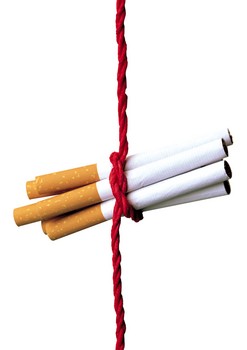Better Spin for Blackwater
Submitted by Sheldon Rampton on

Submitted by Sheldon Rampton on
Submitted by Anne Landman on
Submitted by Diane Farsetta on
To understand how the Bush administration "could fool tens of millions of Americans, intimidate Democrats, and transform the vaunted Washington press corps from watchdogs to lapdogs," look to the 1980s, suggests Robert Parry.
 A recent investigation by BBC Television showed British American Tobacco (BAT) violating its own voluntary marketing and advertising codes in Malawi, Mauritius and Nigeria. Contrary to BAT's public pronouncements that it doesn't want children to smoke, the company was caught using marketing tactics in these countries that are known to appeal to young people, like advertising and selling single cigarettes, and sponsoring non-age-restricted, product branded musical entertainment.
A recent investigation by BBC Television showed British American Tobacco (BAT) violating its own voluntary marketing and advertising codes in Malawi, Mauritius and Nigeria. Contrary to BAT's public pronouncements that it doesn't want children to smoke, the company was caught using marketing tactics in these countries that are known to appeal to young people, like advertising and selling single cigarettes, and sponsoring non-age-restricted, product branded musical entertainment.
As trading has become more global and corporations have become more multinational, countries started discovering that they have little recourse to rein in the harmful behavior of corporations. As public clamor to regulate multinationals has grown, companies have increasingly responded by adopting "voluntary codes of conduct." But what are the real purposes for these codes? Are they just window dressing, or worse?
The following article appeared in the June 2008 issue of The Progressive magazine.
 The nuclear power industry is seeing its fortunes rise. "Seventeen entities developing license applications for up to thirty-one new [nuclear] reactors did not just happen," boasted Frank "Skip" Bowman. "It has been carefully planned."
The nuclear power industry is seeing its fortunes rise. "Seventeen entities developing license applications for up to thirty-one new [nuclear] reactors did not just happen," boasted Frank "Skip" Bowman. "It has been carefully planned."
Bowman heads the Nuclear Energy Institute (NEI), the main lobbying group for the industry. His remarks (PDF), at a February gathering of more than 100 Wall Street analysts, were part of a presentation on "reasoned expectations for new nuclear plant construction."
Bowman knew it was important to impress his audience of wary potential investors. "We are where we are today because this industry started many years ago on a systematic program to identify what went wrong the last time," he said, "and develop ways to eliminate or manage those risks."
Submitted by Anne Landman on
 The American Association of Public Health Physicians (AAPHP) has published an updated analysis of H.R. 1108, the massive bill currently under consideration by Congress that would give the U.S. Food and Drug Administration authority to regulate tobacco products. AAPHP concludes, "This bill is a scam.
The American Association of Public Health Physicians (AAPHP) has published an updated analysis of H.R. 1108, the massive bill currently under consideration by Congress that would give the U.S. Food and Drug Administration authority to regulate tobacco products. AAPHP concludes, "This bill is a scam.
Submitted by Judith Siers-Poisson on
U.S. PR firms seem to be doing well despite uncertain economic times, at least for now. The annual Best Practices Benchmarking Survey by StevensGouldPincus showed that while the industry didn't match its 22% growth of 2006, in 2007 they still managed a 19.7% average profit.The survey found "a remarkable average of $221,388 per professional in annual billings and a huge jump in average monthly fee minimums to $14,000 from $10,000 one year earlier.
Submitted by Diane Farsetta on
Saying "we believe the media whitewashed the candidate," the president of Regnery Publishing announced an August release for a book titled "The Case Against Barack Obama: The Unlikely Rise and Unexamined Agenda of the Media's Favorite Candidate." The PR firm Creative Response Concepts (CRC) is promoting the book.
Submitted by Diane Farsetta on
"Horrified directors of global marketing giant Young & Rubicam have begun a sell-off of their holdings in Zimbabwe, after learning the company's head was behind Robert Mugabe's election campaign image makeover," reports Rowan Philp.
Submitted by Anne Landman on
 Most American cigarette makers, including Philip Morris (PM), have used ammonia in their manufacturing processes for decades, to "puff up" tobacco to increase its volume, highlight certain flavors, help hold together reconstituted tobacco sheet and reduce the amount of
Most American cigarette makers, including Philip Morris (PM), have used ammonia in their manufacturing processes for decades, to "puff up" tobacco to increase its volume, highlight certain flavors, help hold together reconstituted tobacco sheet and reduce the amount of
Center for Media and Democracy (CMD)
520 University Ave, Ste 305 • Madison, WI 53703 • (608) 260-9713
CMD is a 501(c)(3) tax-exempt non-profit.
© 1993-2025